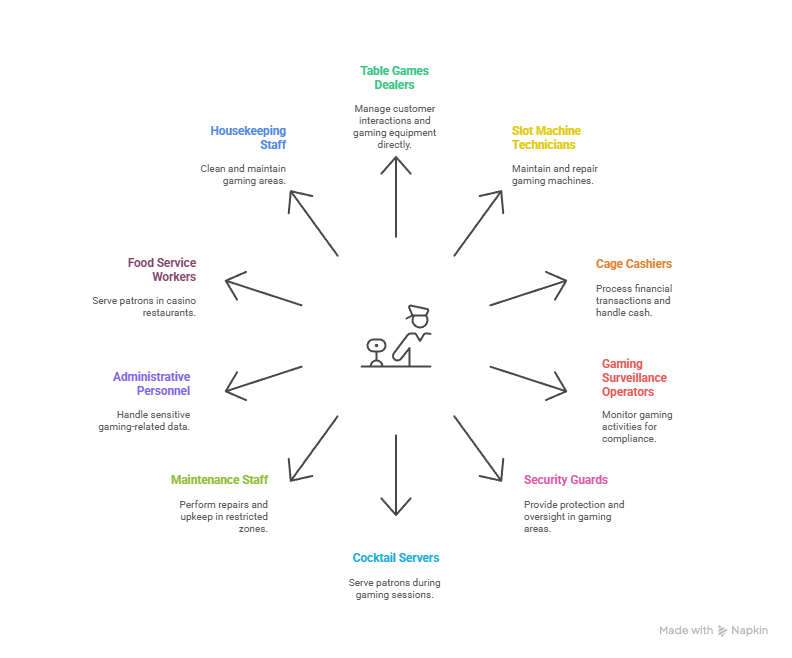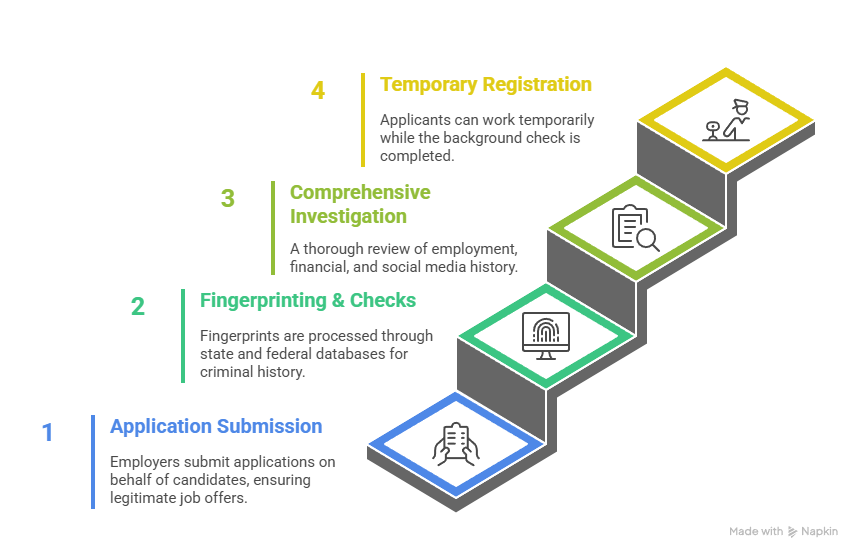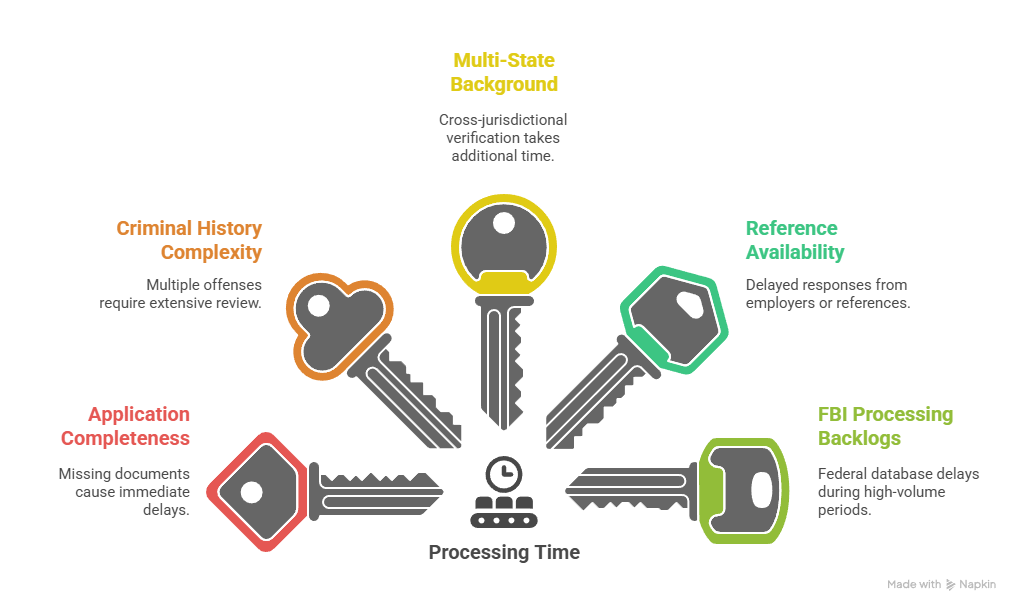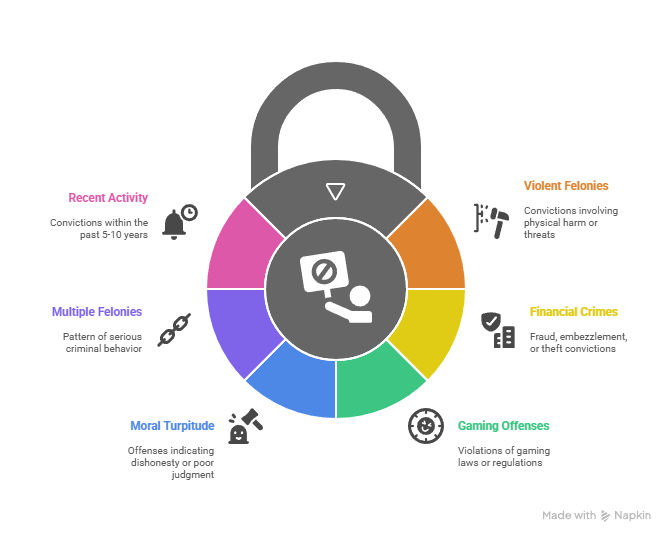Nevada casino background checks are mandatory for all gaming employees and are processed through the Nevada Gaming Control Board's stringent Gaming Employee Registration (GER) system under NRS 463.335. The comprehensive process takes 30-120 days, allows temporary work during review, and requires renewal every five years with ongoing compliance monitoring.
Key Takeaways
- All casino positions in Nevada require Gaming Employee Registration through the Nevada Gaming Control Board
- The background check process takes 30-120 days but allows temporary work registration during review
- Direct gaming roles and support positions with gaming area access must complete registration
- The comprehensive investigation includes criminal history, employment verification, financial background, and social media review
- Registration expires every five years and requires renewal with ongoing compliance monitoring
- Certain felonies and gaming-related offenses may automatically disqualify applicants
- Appeals can be filed within 60 days of adverse decisions through the Nevada Gaming Commission
- Processing fees typically range from $75-$150 plus additional incidental costs
Understanding Nevada Gaming Employee Registration Requirements
Nevada's casino industry operates under the most stringent background check requirements in the United States, establishing the gold standard for gaming regulation worldwide. The Nevada Gaming Control Board (NGCB) mandates comprehensive background checks for all casino staff through its Gaming Employee Registration (GER) system, which aligns with Nevada Revised Statute (NRS) 463.335. This regulatory framework ensures the integrity of Nevada's $12.8 billion gaming industry while protecting both operators and patrons.
The Gaming Employee Registration system covers an extensive range of positions within Nevada's gaming establishments. Anyone involved in gaming operations or who has access to gaming areas must complete the registration process, regardless of their employment status or hours worked. This comprehensive approach helps maintain the trustworthiness that has made Nevada the premier gaming destination globally.
Who Must Register as a Gaming Employee
Nevada's gaming employee registration requirements are comprehensive and apply to both direct gaming roles and essential support functions. The breadth of coverage ensures that every individual who could potentially influence gaming operations undergoes thorough vetting. Understanding these requirements is crucial for anyone seeking employment in Nevada's casino industry.

Direct Gaming Positions
These positions involve direct handling of gaming equipment, cash transactions, or player interactions that could impact game outcomes or casino operations. Due to their central role in gaming activities, these employees undergo the most scrutinized background check process.
- Table games dealers and supervisors: Handle customer interactions and gaming equipment directly
- Slot machine technicians: Maintain and repair gaming machines with access to internal components
- Cage cashiers: Process financial transactions and handle large cash amounts
- Gaming surveillance operators: Monitor gaming activities and ensure compliance with regulations
- Security guards in gaming areas: Provide protection and oversight in sensitive gaming zones
Support Positions Requiring Registration
While not directly involved in gaming operations, these roles provide essential services within gaming areas and require access to restricted zones. The registration requirement for support staff ensures comprehensive security coverage throughout all casino operations.
- Cocktail servers on gaming floors: Interact with patrons during active gaming sessions
- Maintenance staff with gaming area access: Perform repairs and upkeep in restricted gaming zones
- Administrative personnel involved in gaming: Handle sensitive gaming-related data and documentation
- Food service workers in casino restaurants: Serve patrons who may transition between dining and gaming areas
- Housekeeping staff in gaming zones: Clean and maintain gaming areas during operational hours
The registration requirement extends to all employment classifications, including full-time, part-time, and temporary positions. This comprehensive coverage ensures that Nevada's gaming industry maintains its reputation for integrity and security across all operational levels.
The Nevada Casino Background Check Process
The Nevada casino background check process follows a structured four-step approach designed to be thorough yet efficient. Understanding each phase helps applicants prepare adequately and manage expectations throughout the registration timeline. The process balances comprehensive investigation with practical employment needs through temporary registration provisions.

Step 1: Application Submission Through Employer
Unlike many other states, Nevada requires that background check applications be submitted through the prospective employer rather than directly by the applicant. This unique approach ensures that only candidates with legitimate job offers enter the screening process, creating efficiency for both the NGCB and applicants. The employer serves as the primary liaison throughout the registration process.
The employer-sponsored application system provides several advantages for the overall process. It reduces unnecessary applications from individuals without actual employment opportunities, helps maintain organized records, and ensures that employers are invested in their candidates' success. This collaborative approach also allows employers to provide guidance and support throughout the registration process.
Step 2: Fingerprinting and Criminal History Checks
Fingerprinting represents a critical component of the Nevada casino background check process, providing definitive identity verification and comprehensive criminal history screening. The fingerprints are processed through both Nevada Department of Public Safety and FBI databases, ensuring thorough coverage of state and federal criminal records. This dual-database approach provides complete visibility into an applicant's legal history.
The criminal history review examines not only convictions but also pending charges and arrest records where legally permissible. The NGCB evaluates each case individually, considering factors such as the nature of the offense, time elapsed since the incident, and evidence of rehabilitation. Transparency during this phase significantly improves an applicant's chances of approval.
Step 3: Comprehensive Background Investigation
The comprehensive background investigation extends far beyond criminal history to provide a complete picture of an applicant's suitability for gaming employment. This thorough review examines multiple aspects of an individual's background to ensure they meet Nevada's high standards for gaming industry employment. The investigation process typically represents the most time-consuming phase of the background check.
Key Investigation Components:
| Component | Scope | Evaluation Criteria |
| Criminal History | Federal and state databases | Nature, recency, rehabilitation evidence |
| Employment Verification | Previous employers and references | Professional conduct, reliability, integrity |
| Financial Background | Credit history, bankruptcy records | Financial stability, debt management |
| Civil Court Records | Lawsuits, restraining orders | Legal compliance, personal conduct |
| Social Media Review | Public online presence | Professional behavior, reputation management |
| Associates Review | Personal and professional references | Character assessment, integrity verification |
The investigation process emphasizes honesty and transparency from applicants. Any discrepancies discovered during the review can result in automatic disqualification, making complete accuracy essential throughout the application process.
Step 4: Temporary Registration Period
The temporary registration period allows applicants to begin working while their comprehensive background check continues processing. This practical approach typically lasts up to 120 days, enabling both employers and employees to maintain operational continuity during the review period. The temporary registration provides full work authorization within the gaming establishment.
During the temporary registration period, applicants must maintain complete compliance with all gaming regulations and avoid any activities that could jeopardize their permanent registration approval. Any legal issues or regulatory violations during this period can result in immediate revocation of temporary privileges and potential disqualification from permanent registration.
Timeline and Processing Expectations
Nevada casino background check processing times follow established legal frameworks while accommodating individual case complexities. The Nevada Gaming Control Board has up to 120 days to complete the background check process, though many straightforward cases conclude within 30-60 days. Understanding the factors that influence processing times helps applicants set realistic expectations and plan accordingly.
Standard Processing Timeline
| Phase | Timeframe | Key Activities |
| Application Submission | 1-3 days | Employer submits application to NGCB |
| Initial Review | 7-14 days | Document verification and preliminary screening |
| Fingerprinting | 5-10 days | FBI and state database processing |
| Comprehensive Investigation | 15-90 days | Background verification and reference checks |
| Final Decision | 3-7 days | Registration approval or denial notification |
Several factors can extend processing times beyond the standard timeline. Complex criminal histories require additional review and documentation, while multi-state employment or residence histories necessitate coordination between various jurisdictions. High application volumes during peak hiring seasons can also impact processing speeds.
Factors Affecting Processing Time

- Application completeness: Missing documents or incomplete information cause immediate delays as the Nevada Gaming Control Board must request additional materials before proceeding with the comprehensive background investigation.
- Criminal history complexity: Multiple offenses or serious criminal charges require extensive review and documentation, as investigators must thoroughly evaluate each incident's nature, circumstances, and evidence of rehabilitation.
- Multi-state background: Cross-jurisdictional verification takes additional time because the Nevada Gaming Control Board must coordinate with various state agencies and law enforcement databases to obtain complete records.
- Reference availability: Delayed responses from employers or personal references can significantly extend processing timelines, particularly when investigators need to verify employment history or conduct character assessments.
- FBI processing backlogs: Federal database delays during high-volume periods can slow down fingerprint processing and criminal history checks, especially during peak hiring seasons or when technical issues affect federal systems.
Applicants can minimize processing delays by ensuring complete and accurate application submissions, maintaining open communication with their employers, and promptly responding to any NGCB requests for additional information.
Registration Renewal and Ongoing Compliance
Gaming employee registration in Nevada requires ongoing maintenance beyond the initial approval process. The five-year renewal cycle ensures that the Nevada Gaming Control Board maintains current information on all registered gaming employees while monitoring continued suitability for gaming employment. This ongoing oversight helps preserve the integrity of Nevada's gaming industry.
Five-Year Registration Cycle
Gaming employee registrations expire every five years from the initial approval date, requiring timely renewal to maintain employment eligibility. The renewal process involves updated background checks and verification of continued compliance with gaming regulations. Applicants must begin the renewal process well in advance of their expiration date to avoid employment interruptions.
The renewal process typically requires less extensive investigation than initial registration, focusing on activities and changes since the previous approval. However, any criminal activity, regulatory violations, or significant life changes during the registration period receive thorough review during renewal processing.
Change of Employment Notifications
Nevada gaming regulations require registered employees to notify the NGCB within 10 days of any employment changes within the gaming industry. This notification requirement ensures accurate record-keeping and proper oversight of all registered gaming employees. Failure to provide timely notification can result in registration suspension or revocation.
Notification Requirements:
- Casino transfers: Moving between different gaming establishments
- Department changes: Switching roles within the same casino
- Position modifications: Changes in job responsibilities or access levels
- Employment status changes: Transitions between full-time, part-time, or temporary status
The notification process involves submitting updated employment information through the current or new employer, ensuring that the NGCB maintains accurate records of all registered gaming employees throughout Nevada's gaming industry.
Common Disqualifying Factors and Appeal Rights
Understanding potential disqualifying factors helps applicants assess their eligibility before beginning the Nevada casino background check process. While the Nevada Gaming Control Board evaluates each case individually, certain factors typically result in automatic disqualification or significant obstacles to approval. Knowing these factors enables applicants to make informed decisions about their gaming industry career prospects.
Automatic Disqualifying Factors
Certain criminal convictions and regulatory violations typically result in automatic disqualification from Nevada gaming employment. These factors reflect the high standards required for gaming industry participation and the need to maintain public trust in Nevada's gaming operations. The severity and recency of these factors significantly impact approval chances.
Primary Disqualifying Factors:

- Violent felonies: Convictions involving assault, battery, domestic violence, or weapons charges typically result in automatic disqualification due to safety concerns for patrons and staff.
- Financial crimes: Fraud, embezzlement, theft, or money laundering convictions demonstrate untrustworthiness with casino funds and create unacceptable risk for gaming operations.
- Gaming-related offenses: Previous violations of gaming laws, illegal gambling activities, or cheating at casinos show direct conflicts with gaming industry integrity standards.
- Moral turpitude crimes: Offenses involving dishonesty, perjury, or deceptive practices indicate character deficiencies that conflict with the trust required in gaming employment.
- Multiple felony convictions: A pattern of serious criminal behavior suggests ongoing risk and inability to maintain the high standards expected in Nevada's gaming industry.
- Recent criminal activity: Convictions within the past 5-10 years receive heightened scrutiny as they indicate current behavioral patterns that may pose ongoing risks to gaming operations.
The Nevada Gaming Control Board considers rehabilitation efforts, time elapsed since convictions, and evidence of character improvement when evaluating applications with disqualifying factors. However, certain serious offenses may permanently bar gaming employment regardless of rehabilitation efforts.
The Appeals Process
Applicants who receive adverse decisions have the right to appeal through a structured process designed to ensure fairness and thorough review. The appeals process provides multiple levels of review, including escalation to the Nevada Gaming Commission for final determination. Understanding the appeals process helps applicants navigate potential challenges effectively.
Appeals must be filed within 60 days of receiving the adverse decision, accompanied by supporting documentation and legal arguments addressing the denial reasons. The appeals process allows applicants to present additional evidence, demonstrate rehabilitation, or correct factual errors that may have influenced the initial decision.
Appeals Process Steps:
- Initial Appeal: Filed with the Nevada Gaming Control Board within 60 days
- Board Review: Comprehensive examination of appeal materials and evidence
- Commission Escalation: Further review by Nevada Gaming Commission if necessary
- Final Determination: Binding decision on registration approval or denial
The appeals process emphasizes presenting compelling evidence of rehabilitation, character improvement, and suitability for gaming employment. Professional legal representation often proves beneficial during complex appeals involving serious criminal histories or regulatory violations.
Cost Considerations and Financial Planning
Understanding the financial obligations associated with Nevada casino background checks helps applicants prepare adequately for the registration process. While fees vary based on investigation complexity and individual circumstances, typical costs range from $75-$150 for standard processing. Additional expenses may include document preparation, transportation, and potential legal consultation costs.
| Cost Type | Item | Amount/Description |
|---|---|---|
| Direct Costs | Processing fees | $75-$150 for standard background check processing |
| Fingerprinting charges | $25-$50 for fingerprint submission and processing | |
| Document fees | $10-$30 for certified copies of required documents | |
| Indirect Costs | Transportation | Travel expenses for fingerprinting appointments or interviews |
| Document preparation | Notarization, certification, and copying costs | |
| Time off work | Potential income loss during application processing | |
| Legal consultation | Professional advice for complex cases or appeals |
Financial planning for these costs prevents unexpected obstacles during the registration process and ensures smooth progression through all required steps. Many employers provide guidance on cost expectations and may offer assistance with certain expenses.
Best Practices for Job Seekers

Successful navigation of the Nevada casino background check process requires careful preparation, complete honesty, and proactive communication. Following established best practices significantly improves approval chances while minimizing processing delays. These strategies help applicants present themselves as qualified candidates suitable for Nevada's gaming industry.
Pre-Application Preparation
Thorough preparation before beginning the application process establishes a strong foundation for success. Gathering required documents, reviewing personal history, and addressing potential concerns proactively demonstrates professionalism and commitment to the process. This preparation phase often determines the overall success of the registration application.
Complete honesty about personal history, including criminal records, employment issues, or financial problems, builds trust with the Nevada Gaming Control Board and prevents disqualification due to misrepresentation. Attempting to hide or minimize negative information typically results in automatic denial and potential permanent disqualification from gaming employment.
Working with Employers
Maintaining open communication with prospective employers throughout the registration process ensures coordinated efforts and prompt resolution of any issues. Employers serve as valuable allies during the background check process, providing guidance, support, and advocacy when needed. Building strong relationships with employers demonstrates commitment and professionalism.
Regular updates on application progress, prompt responses to employer inquiries, and proactive communication about potential delays or issues show responsibility and dedication to the employment opportunity. This collaborative approach often leads to successful registration and positive long-term employment relationships.
Conclusion
Nevada's casino background check process represents the gold standard for gaming industry regulation, ensuring the integrity and trustworthiness that has made Nevada the premier gaming destination worldwide. The comprehensive Gaming Employee Registration system, governed by NRS 463.335, requires thorough vetting of all gaming employees while providing practical accommodations like temporary registration to maintain operational efficiency. Understanding the four-step process, timeline expectations, and ongoing compliance requirements enables applicants to navigate the system successfully and build rewarding careers in Nevada's gaming industry. With proper preparation, complete honesty, and proactive communication with employers, qualified candidates can achieve registration approval and contribute to Nevada's continued leadership in gaming excellence.
Frequently Asked Questions
How long does a Nevada casino background check take to complete?
The Nevada Gaming Control Board has up to 120 days to complete background checks, though straightforward cases often conclude within 30-60 days. Complex histories or multi-state backgrounds may extend processing to the full 120-day limit.
Can I work at a casino while my background check is being processed?
Yes, you can begin working under temporary registration once your employer submits the application. This temporary status typically lasts up to 120 days while your comprehensive background check continues processing.
What happens if I have a criminal record?
Each case is evaluated individually based on the nature of the offense, time elapsed since the incident, and evidence of rehabilitation. While certain serious crimes may disqualify applicants, many minor or older offenses don't automatically prevent gaming employment.
Do I need a new background check if I change casino employers?
You must notify the Nevada Gaming Control Board within 10 days of employment changes, but a new full background check isn't required if your current registration remains valid. The notification process updates your employment records.
How much does the Nevada casino background check cost?
Costs typically range from $75-$150 for processing and fingerprinting fees, plus potential additional expenses for document preparation, transportation, and any required legal consultation.
Can I appeal if my application is denied?
Yes, you have 60 days to file an appeal with the Nevada Gaming Control Board, with options to escalate to the Nevada Gaming Commission if necessary. The appeals process allows presentation of additional evidence and rehabilitation efforts.
What jobs require gaming employee registration in Nevada?
All positions involving gaming operations or access to gaming areas require registration, including dealers, slot technicians, cage cashiers, surveillance operators, security guards, cocktail servers, maintenance staff, and administrative personnel in gaming areas.
How often do I need to renew my gaming employee registration?
Gaming employee registrations expire every five years and require renewal to maintain employment eligibility. The renewal process involves updated background checks and verification of continued compliance with gaming regulations.
What are the most common reasons for application denial?
Common disqualifying factors include violent felonies, financial crimes, gaming-related offenses, crimes involving moral turpitude, multiple felony convictions, and recent criminal activity within the past 5-10 years.
Can I check my application status during processing?
Yes, you can check your application status through your employer, who serves as the primary liaison with the Nevada Gaming Control Board throughout the registration process.
Additional Resources
- Nevada Gaming Control Board Official Website
https://gaming.nv.gov/ - Nevada Revised Statutes Chapter 463 - Gaming Control
https://www.leg.state.nv.us/NRS/NRS-463.html - Gaming Employee Registration Application Forms
https://gaming.nv.gov/index.aspx?page=32 - Nevada Gaming Control Board Employment Opportunities
https://gaming.nv.gov/hr/working/ - Nevada Gaming Commission Meeting Minutes and Reports
https://gaming.nv.gov/uploadedFiles/gamingnvgov/content/about/Quarterly%20Report%20Jan%202025%20-%20UPDATED.pdf

GCheck Editorial Team
Meet the GCheck Editorial Team, your trusted source for insightful and up-to-date information in the world of employment background checks. Committed to delivering the latest trends, best practices, and industry insights, our team is dedicated to keeping you informed.
With a passion for ensuring accuracy, compliance, and efficiency in background screening, we are your go-to experts in the field. Stay tuned for our comprehensive articles, guides, and analysis, designed to empower businesses and individuals with the knowledge they need to make informed decisions.
At GCheck, we're here to guide you through the complexities of background checks, every step of the way.





